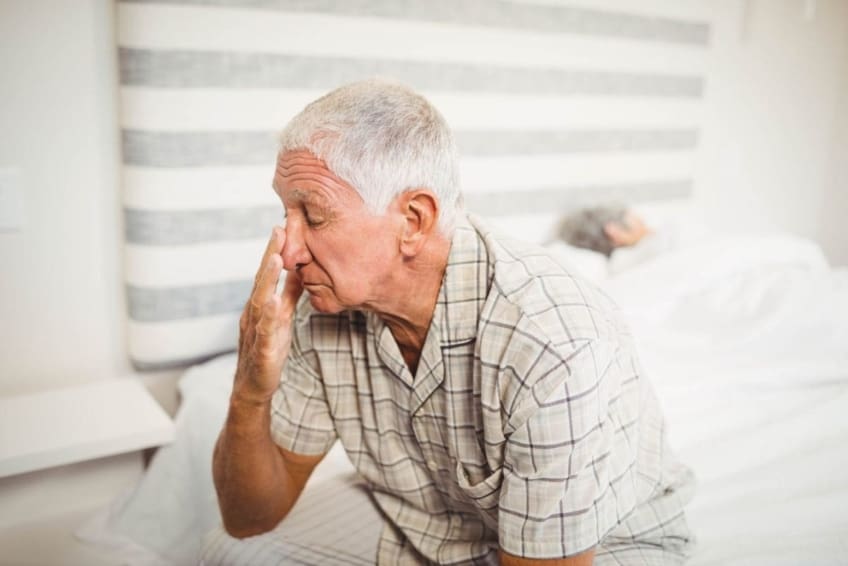
Most healthy older adults aged 65 or older need 7-8 hours of sleep each night to feel rested and alert. But as you age, your sleep patterns may change. These changes can cause insomnia, or trouble sleeping.
Common sleep changes in older adults include:
- Getting tired earlier in the evening
- Waking up early in the morning
- Waking up in the middle of the night and not being able to go back to sleep
- Having insomnia, which is a condition that makes it hard to fall asleep and/or stay asleep
Path to improved health
Older adults often see their sleep-wake cycle change. This can be caused by many different factors, including:
- Your body’s chemicals and hormones. For example, as you age, your body produces less melatonin. This is the natural hormone that regulates your sleep cycle.
- Lifestyle habits. These include smoking and drinking alcohol or caffeine.
- Certain medicines including antidepressants, beta-blockers, and cardiovascular drugs.
- Dealing with pain.
- Diabetes and prostate issues can contribute to sleep disturbance and make you fatigued as you wake up multiple times to urinate.
- Congestive heart failure or kidney disease. You may have trouble lying flat and getting comfortable enough to fall asleep.
If you find yourself sleeping in a recliner or waking up many times throughout the night, it is important to talk to your doctor. He or she can make sure underlying health problems aren’t causing your sleep issues.
Sleep apnea
One common sleeping disorder is sleep apnea. It causes a person’s breathing to abnormally stop and start, while sleeping. People who have sleep apnea often snore loudly. You stop breathing for 10 to 30 seconds at a time. When you start breathing again, you gasp or snort, which can wake you up. This can occur hundreds of times in a single night. Each time you wake up, it disrupts your sleeping pattern. It can be harmful if you stop breathing for too long. It also can cause high blood pressure and increase your risk of a heart attack.
Restless legs syndrome (RLS)
RLS is a condition in which you have leg pain or discomfort. It occurs when you are sitting or lying down. It can feel like your legs won’t be still. RLS can make it hard for you to sleep.
Periodic limb movement disorder (PLMD)
PLMD is a condition in which you kick your legs while you sleep. Most of the time, you don’t know you’re kicking. If you have a bed partner, they may tell you about it. PLMD can prevent good sleep and cause daytime fatigue. Some people may have RLS and PLMD.
Things to consider
If your sleep-wake cycle changes as you get older, these tips may help:
- Go to bed and get up at the same time each day, even on the weekends.
- Do not take naps longer than about 20 minutes.
- Do not read, watch TV, or eat in bed. Only use your bedroom for sleep.
- Avoid caffeine for about 8 hours before bedtime.
- Avoid nicotine and alcohol in the evening. Alcohol might help you fall asleep, but it can cause you to wake up in the middle of the night.
- Do not lie in bed for a long time trying to go to sleep. After 30 minutes of trying to sleep, get up and go to a different room. Do something quiet, such as reading or listening to music. Do not do anything that stimulates your brain. Then, go back to bed and try to fall asleep.
- Try to be active each day. Regular exercise will often help you rest better.
- Ask your doctor if any of your medicines could be keeping you awake at night.
When to see a doctor
Talk to your doctor if you have trouble sleeping. He or she will review your symptoms and may run tests to confirm a sleep condition. Your doctor also can prescribe medicine or treatment to help you sleep.
Questions to ask your doctor
- How many hours should I sleep each night?
- Could medicines I take affect my sleep?
- Do I have a health problem that could affect my sleep?
- I seem to sleep fine, but I’m tired all day. What’s wrong?
- Is it okay to nap for longer than 20 minutes during the day if I feel I need it?
Resources
![]()
Copyright © American Academy of Family Physicians
This information provides a general overview and may not apply to everyone. Talk to your family doctor to find out if this information applies to you and to get more information on this subject.







